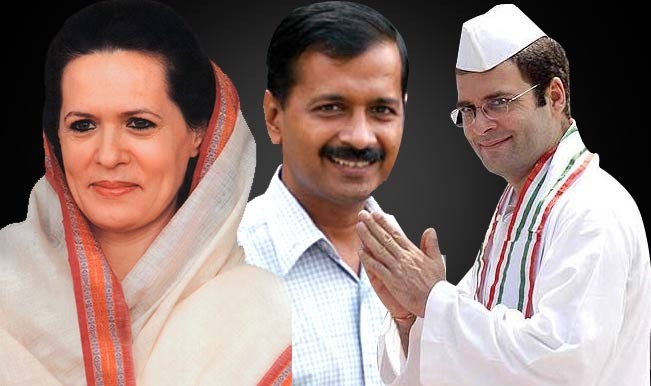
The Twitter spat between Arvind Kejriwal and Rahul Gandhi made for tasty TRP masala during polls, but the underlying desperation of the two parties struggling with a similar existential crisis (albeit on different scale) is not to be missed. Beneath the grandstanding and the one-upmanship lies a deep-seated worry and a difficult dilemma plaguing both the Aam Aadmi Party and the Congress. And a new reality that confronts all Opposition parties: BJP’s aggressive rise.
The dilemma is not whether AAP and the Congress should strike an alliance to keep the BJP out. That boat sailed a long time ago. This is now a necessity before the shadow of a hegemonic BJP. Therefore, we find AAP chief Kejriwal, who cut his teeth in politics and built his political career on an anti-Congress platform, prostrate before the Grand Old Party and almost beg for a tie-up. No point accusing Kejriwal of hypocrisy. The first lesson in politics is that of survival. The AAP chief is a pragmatist. But here’s where he has run into a dilemma.
The AAP is aware of two realities that have served to constrict its ambition. One, it has hardly any clout outside the national capital. Two, even in Delhi, its fortunes are on decline. So, the task before Kejriwal is two-fold. He must resurrect AAP’s fortunes in Delhi and help the young party spread its wings outside Delhi. To do that, the AAP has proposed an alliance with the Congress in all 33 seats across northern India in Haryana (10), Punjab (13), Chandigarh (1), Delhi (7) apart from the western state of Goa (2).
This serves AAP’s purpose because it may piggyback on Congress’ presence in these states and increase its footprint in states such as Haryana, where it gets no more than five percent vote share. The situation is somewhat different in Punjab where AAP bagged 20 seats and 23.8 percent vote share in 2017 Assembly elections, but here the party has been hit by an exodus and steady loss of clout.
It is quite clear to the AAP, given the 2017 Delhi civic poll results, which way the wind is blowing. The BJP, which suffered a rout in 2015 Delhi Assembly polls, swept 181 of the 270 wards in the three civic bodies: 43 more than last time. The AAP got 48 and the Congress, 30.
So, the task before AAP is clear. But the dilemma lies in convincing the Congress to ally with it in all 33 seats in northern states including Goa, and the Congress which has its own poll calculations to think of, is not ready to play ball.
The Grand Old Party was initially averse to tie-up with the AAP even in Delhi. Its local unit, now headed by former chief minister Sheila Dikshit, is aware of the AAP’s waning fortunes and the anti-incumbency factor at work and tried its best to dissuade high command. While the Congress is not averse to this reality, it is equally aware that lack of any alliance with AAP might be akin to gift-wrapping Delhi to the BJP. The Congress, despite its reservations, eventually warmed up to the idea.
But then it was hit by its own dilemma. The AAP is insisting on a package deal where Delhi is just one among many states, and Congress would have none of it. It understands AAP’s game, and is also aware that Kejriwal’s party may grow only at its own expense in states such as Punjab, Haryana and Chandigarh.
Ahmed Patel, Congress’ brain behind the alliance strategy, recently told the media that Congress’ local units of Punjab and Haryana were not ready to tie-up with the AAP. “We are openly giving a 3-3 formula (for Delhi) and one seat for a common candidate. Then they said that they will take four. But they put a condition that they will forge an alliance only if the alliance takes place for Haryana as well. What is his intention to link Delhi with Haryana? I don’t understand.”
If AAP is battling a survival crisis in states outside Delhi, the Congress isn’t on a good wicket either. It cannot afford to barter away its seats in Haryana or Punjab where it enjoys a sizeable presence and hopes to build on it to claw back into national reckoning.
The AAP’s logic is also in place as it strives for a hard-nosed bargain. It has declared that it does not need Congress’ help to stave off BJP in Delhi, thank you, but in the interest of keeping BJP away in the other northern states it is willing to go into a seat-sharing deal.
In this context, the Twitter spat between Rahul and Kejriwal indicates a softening of stance from both sides and a will towards renewed negotiation. Media reports indicate a meeting in this regard is planned on Wednesday with NCP chief Sharad Pawar being the mediator. The Twitter war, therefore, could merely be positioning before striking a deal.
Despite these seemingly irreconcilable dilemmas, a deal between AAP and Congress at least in Delhi is extremely likely, because the question of expansion comes only after its survival, not before. It won’t surprise if Kejriwal eventually backs down from a package deal and decides to concentrate on saving Delhi. His need is greater than Rahul's.


.jpeg)

